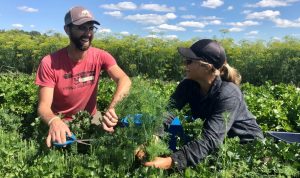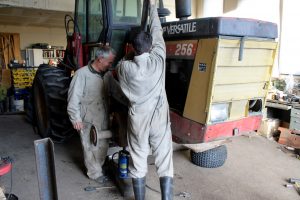Aspiring farmers have a unique opportunity to gain hands-on experience and learn about farming through the Young Agrarians Apprenticeship Program.
Open to participants from both rural and urban backgrounds, the program matches apprentices who have an interest in learning about farming with mentor farms. There are 35 mentor farms and 31 apprentices involved in this year’s program, which spans the three Prairie provinces. The Young Agrarians program is still accepting applications for apprentices for select farms.
“We see the program as an entry point into farming for young people who think that they want to be farmers,” explains Kolby Peterson, Young Agrarians Alberta apprenticeship coordinator. “Many who apply are pretty sure that farming is their career path or vocation, but they might not be ready yet to manage a farm, buy a farm, or start their own farm business.
“The apprenticeship program helps solidify their conviction that this is the direction that they want to go in. There are a few who realize that farming is maybe not their wheelhouse, but the program gives them the skills and perspective to help make that decision.”
One of the most important things, said Peterson, is that apprentices gain a community and network of mentors and aspiring farmers who are alongside them for the journey.
Making a match
Each year, the Young Agrarians creates a list of approved mentor farmers. Mentor farmers must meet a number of criteria, including having five years of farming experience, practicing regenerative farming, and having the desire and time to teach and mentor an apprentice. All participating farms are subject to a site visit and must have Workers Compensation Insurance.
People who are interested in the apprenticeship side need to complete an application process, which includes submitting a short essay on their vision for regenerative agriculture and an interview. Successful apprentices then apply to work at the mentor farms. The mentors conduct interviews and select the apprentice they feel is the right fit for their farm.
“Most apprentices start their positions in late April or early May,” said Peterson. “Their curriculum is agreed upon and carried out mostly through their experience on their farm. The day in and day out activities, where they receive the bulk of the mentoring and learning, happen on the ground on their farm.”
Most apprenticeships last eight to 12 months—with the apprentice being fully immersed in all aspects of the farm business—such as caring for soil, pasture and livestock, farm direct marketing, and using sustainable practices for cereal, grain and vegetables.
In addition to the on-farm, hands-on learning, apprentices also receive supplementary online education in the form of webinars and events, and participate in farm tours. Peterson said that once a month the coordinators and apprentices tour mentor farms to encourage learning and community building.
“We tour a cluster of farms, sharing a geographical area together. They get to see what different operations look like and how different scales of farms work and work flow—and kind of give them fodder to think about how other farms work.”
A diversity of farms
The mentor farms are varied and the farmers themselves have diverse expertise and skill sets. Mentor farmers recognize the connectedness of the land and people and represent the principles of regenerative agriculture.
“This year we have an amazing diversity of farmers,” said Peterson, with “everything from organic grain farmers, livestock, mixed livestock, market gardens, and apiaries. There are plenty of opportunities if apprentices are just into vegetables; there are some that are solely vegetables or market gardens. We have some flower farmers; we have some dairies.
“If you can think of it, we probably have a farm that has it.”
All farms involved in the program follow the principles of regenerative agriculture, which include minimizing or eliminating tillage, protecting and covering the soil, maintaining living roots in the soil, increasing biodiversity and integrating livestock.
Preparing for the next generation
Canada’s 2021 Census of Agriculture pegs the average age of Canadian farmers at 56, while the median age is 58 years. This means there is the potential that a number of farmers will retire in the near future.
“We have a lot of retiring farmers. It’s not just in Canada; this is a trend happening all over the world. (These farmers) are going to retire in the next 10 years or so and we don’t have a lot of successors,” said Peterson, adding that a recent survey indicated that 74 per cent of farmers say that they will be selling their land in the next 10 years.
“That’s a huge land transfer that’s going to take place.”
Peterson said the Young Agrarians is trying to do its part to help equip young people to be ready to take over the land and to be ready to manage and steward it responsibly.
“We will need this new crop of farmers, so to speak. This program is … helping people who are thinking about this or aspiring to do this to able to find a place to land and get their feet on the ground.”
More information on the Young Agrarian Apprenticeship Program, including application forms, can be found on the Young Agrarian website at https://youngagrarians.org/apprenticeship-program.


